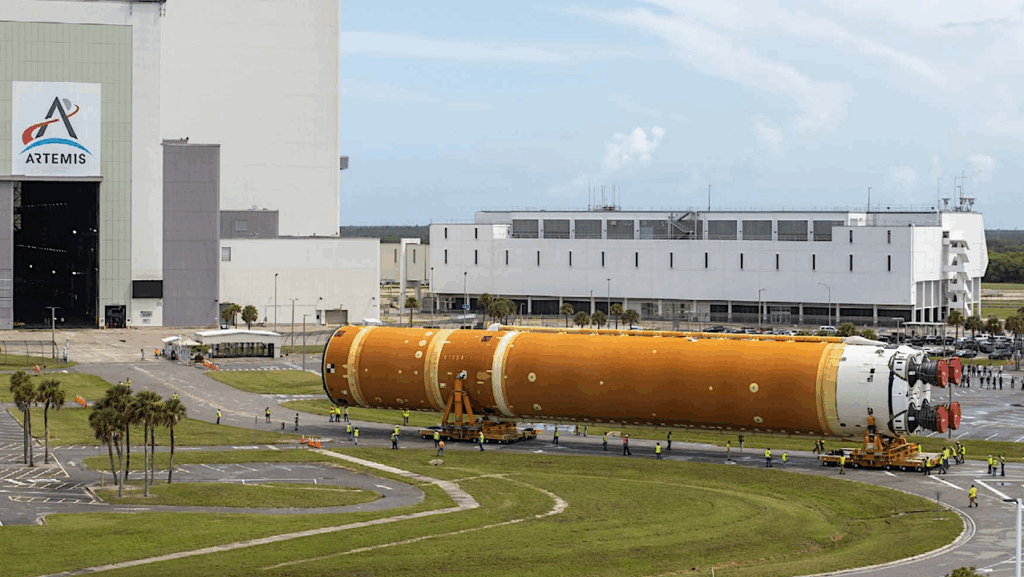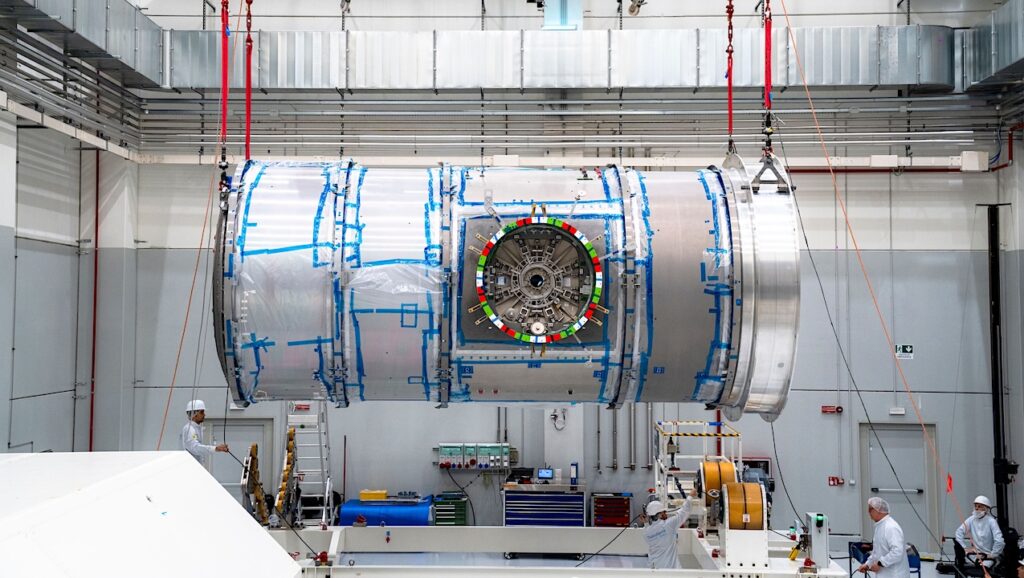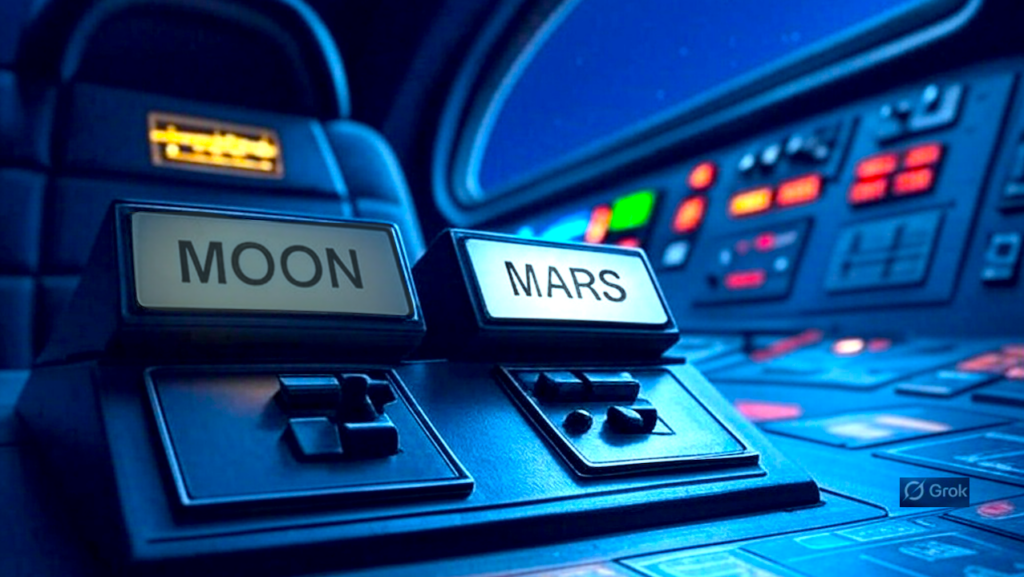Actual Americans Like Space But Can't Agree on Where To Go Next

Space Exploration: Attitudes toward the U.S. Space Program, AP
“Ahead of the 50th anniversary of the U.S. moon landing, 60% say the space program has provided enough benefit to the country to justify its cost, while 38% do not consider the country’s expenditures on the space program warranted. Most Americans say it is important for the space program to monitor objects including asteroids, comets, and other objects that could impact the Earth, as well as scientifically research the universe, our solar system, and the Earth. On the other hand, the establishment of permanent human settlements on other planets or developing an American military presence in space are not considered priorities.” … “There is not overwhelming enthusiasm for returning to the moon. In March, Vice President Mike Pence called for NASA to send astronauts to the moon within five years.[1] Forty-two percent favor that idea, while 20% oppose and 38% neither favor nor oppose. Thirty-seven percent say sending astronauts to Mars should take precedence over going back to the moon, while 18% would rather have NASA send more astronauts to the moon. But 43% do not think either action should be a priority for the country. While about half of Americans would take the opportunity to orbit the Earth, most say they have no interest in traveling to the moon or Mars. Space travel has more appeal for younger adults.”









As someone pointed out elsewhere, this is some crazy numbers. If you read the actual question, basically 15% of the US population is willing to move to the first Mars colony even if there’s no chance of ever returning to Earth. The pioneering spirit of this country is alive and well.
Those numbers aren’t bad. For reference the Americans that moved to the Western Frontier in the 1800’s was well under 5% of the U.S. population. In the 1600’s the number of English emigrating to the American colonies was only 4,000 a year and that was only after the colonies were established. Even during the Irish famine only about 12% of the population emigrated despite the incentives the UK provided, less than the number that died during it.
Populations are far less mobile than the popular image of pioneers. Historically pioneering new frontiers is limited to only a very small minority and space will be no different.
In addition, the people polled were asked about settling a particular place. And they were Americans (i.e. from a country a lot of people would like to immigrate to.) I’ve said this before, but historically, people migrate away from a place they don’t want to live, not (or not as much) to a place they do want to live.
Yes. The good news is that you only need to reach a emigration rate of around 2,000 a year to build a viable Solar System wide economy in a generation.
Why did you pick that number? “Generation” is vague, but I guess that would be a population of about 50,000 less fatalities. I’m not sure that’s enough. We aren’t talking about Jamestown or Plymouth or even Deseret. I think it’s important for the economy to be largely self-sufficient to be viable. For an agrarian colony on Earth, that means one thing. But in space, there’s a whole lot of high technology equipment that needs to be repaired or replaced. I think that implies a larger population.
Around 2,000 year is the about the emigration rate to various early North America settlements that were successful from records. It is also achievable with a reasonable launch rate if the use of local materials has advanced to the point to be self-sufficient in food, water and materials to build/expand settlements.
In terms of skill categories keep in mind that many skills and professions on Earth either won’t be needed in Space or will only require a generalist’s skills. For example, expect reusable and recyclable glass containers to replace most plastic and metal packaging for food storage as was the case decades ago. Think of mason jars versus cans of soup or plastic water bottles. The variety of consumer goods will be less, with a return to the type of durables that were common in households decades ago.
Skills in high demand of course would be engineering skills, working with robots, computer programming, horticulture, etc. If you good through the BLS list of job categories it is amazing how many just won’t be needed in a space settlement. Like all pioneer communities it will be made up of practical generalists rather then extreme specialists. But it is also why it’s critical we start modeling space settlements on Earth ASAP.
There are certainly many products and professions a colony could easily do without. Reusable goods are clearly a better choice than ones which are simply recycled (and a far better one than things which can’t even be recycled.) And there are many tasks which can be automated. I expect 3D printing will be extremely useful. But think of all the parts required to build or repair a 3D printer. And the equipment required to make those parts, and the parts required to make and maintain that equipment. That implies more people and more skills than farming in Virginia or New England.
Those skills also tend to require some specialization. You can’t expect a machinist to turn off the lathe and take a shift operating a nuclear reactor. I’m sure there are people who can do it. (Rr, more likely, reactor operators are adequate machinists. But I wouldn’t expect them to be well-practiced or efficient machinists.) I’d be more inclined to agree with you if you’d said a few thousand per year and a few generations. Two thousand and two generations strikes me as too few.
I see AI as being a workforce multiplier, but the truth is we really need to start modeling these space habitats on Earth to determine what is needed and what could be skipped. There has been so much focus on the spacelift element that the part about what needs to be lifted has been neglected.
is that “pioneering spirit” or “lemming spirit” ?
Answering a poll question and being presented with the actual opportunity are two different things.
In marketing surveys generally the rule of thumb is only 1 in 10 who say they will buy the product will actually do so.
There have been classic studies that showed that respondents will underestimate the amount of beer they consume and claim they only buy expensive brands of imported beer instead of the cheapest brands available. It’s just basic human nature.
Its too bad NASA has not laid out a logical and progressive plan for what they would like to do. Maybe if there were a plan people might agree on what we ought to do next. Gateway and Orion is no plan at all.
This is because we are deep into a 40 year technology intensive experiment on the human race that is unlike anything our species and its brain has had to deal with in over the past 200,000 years. The amount of information and how it impacts human emotions is immense and often misleading. Our science fiction space travel far exceeds our true space programs and capabilities. It is therefore not surprising in general that the public, though enamored with space flight, does not understand all the intricacies involved and therefore cannot agree on a path forward. And thus we remain flying circles around Earth for 50 years. The commitment to getting human populations off Earth will require a radical shift in space fight goals from the traditional “science” reason to a “settlement” directed paradigm which includes using local resources. And ultimately, available resources will drive the choice of the best destination. This will also include the need for larger population spacecraft that are safe. Until this happens, the controversy will remain.
I couldn’t have said it better. That is, if the survey is accurate.
What do polls mean anymore ? Polls predicted that Trump wouldn’t win …
They mean as much as ever, if they’re done correctly. And the polls over Mr. Trump’s election weren’t the first or worst goof of that sort. Ever hear of the Chicago Daily Tribune’s 1948 headline, “Dewey Defeats Truman”? Sample biases are an issue. Cranky hermits who won’t give pollsters the time of day are always undercounted. The wording of the questions is another issue. In this case, people were asked if we were spending too little, about the right amount or too much on space. The answers would have been a bit different if they had asked what fraction of the federal budget should be spent on space.
Plus many folks are just tired of political polls and either give false answers or politically correct ones.
Actually, I am pretty surprised that 38% did not consider space expenditures worthwhile. I mean, even to have commandeered the phrase “if we can go to the moon, then surely we can…” (fill in the blank) should have justified Apollo! Believe me, the Chinese have certainly taken note, and are guiding their activities with this in mind. It is a sign of dominance, a touchstone of our culture. Perhaps with the expenditure of billionaires’ money (instead of taxpayers money) this attitude will change. Although I still hear, “the money would be better spent on Earth” (regarding SpaceX’s plans) even when I tell them that 1. It is not taxpayers money, a rich person should be able to spend their money on whatever they want! and 2. All the money is spent on Earth!
Remember, given the question, that 38% include the people who think NASA gets a large fraction of the federal budget. A fair number of people think it’s over 10%, not under 1%. If they had asked if 0.5% of the total budget (or 1.5% of the discretionary budget) was too much, they probably would have gotten a very different answer.
Most Americañs cannot agree on where to go because I am pretty sure they have no idea where we are, where we have been or what the options are for the future. A few years ago most thought the Shuttle went to the Moon routinely. Now most think NASA is defunct. People going to Mars; they thought there were people driving those rovers for years
I’ve met lots of people who thought “The Martian” book/movie was based on a true story. On the other hand, I’ve also met lots of people who thought “Apollo 13” was a fiction story.
From my personal sampling, talking with various people (non-NASA and non-aerospace co.) and none are aware of the Artemis program. Some are confused when I said US should first put rovers on the moon before people. “huh, I thought they’ve been doing that for years.”
In general polls are ok for what they are but for the space program I think the real important ones to convince are those who will deliver the money. It’s not the general public as they have no say in the matter.
Many, perhaps most who are aware of Artemis are skeptical that anything will ever come of it. Based on this article, $30 billion has been spent over the last 15 years and neiother SLS nor Orion have yet flown-probably wont fly with a crew for another 4-5 years. Then in 3 flights they will land a crew on the moon. Of course far far the best they’ve been able to do with their $30billion is stripped down prototype Orions launching on re-purposed military or commercial rockets. SLS using leftover Shuttle engines and tankage has yet to ever be assembled or tested. Orion is underpowered and cannot get to the Moon so they are wasting time on a Gateway, and no one is quite sure what that buys except more expense and more danger for the astronauts since they have to descend from a very high orbit and then launch and achieve a very high orbit. Isd it any wonder that people are skeptical??
https://arstechnica.com/sci…
The Smihtsonian has a web article up with info about the attitude of JFK and the public in the 60s towards Apollo that I do not believe is generally known. Was news to me. May surprise you, too. If the info is correct, public and political attitudes towards human spaceflight haven’t changed in over 50 years. Link is below, Long article; keep scrolling and you’ll get to the JFK material.
https://tinyurl.com/yx9oshut